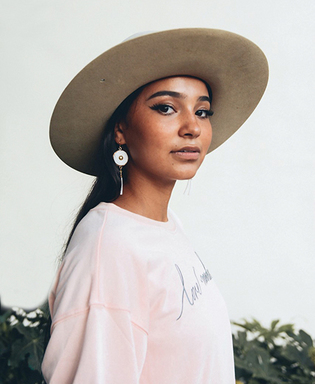
Erica Elan Ciganek
Kinsale Hueston
Poet
By Sylvia Brownrigg ’86
When poet Kinsale Hueston ’22 was invited to perform at a gathering last September to celebrate the 50th anniversary of coeducation in Yale College, she experienced a moment “when all of my girlfriends and I looked at each other and we realized how long ago that really—wasn’t.” She laughs as she describes looking at her audience, the women from that pioneering class, and noticing that they were “the same age as our parents! Not quite as old as our grandparents.” It hit her: “Oh my god, this is really a recent thing.”
The accomplished Hueston, a 2017–2018 National Student Poet, winner of Yale College’s J. Edgar Meeker Prize, and an enrolled member of the Navajo Nation, had a great time meeting those first women graduates, though it did not escape the young writer’s notice how many of them were white. “Even when we are celebrating this coeducation,” she notes, “we have to ask: Who really was doing the coeducating?”
Hueston knows what it is like to be in an early cohort at Yale. As a Native woman, she finds that there are still plenty of times when she’s “the first in spaces at Yale.” She gives student government as an example: when Hueston joined the Yale College Council Senate last year, the council’s previous president told her he believed there had never been a Native woman in that structure before. For others in the senate there are affinity groups, so members can have mentors from similar backgrounds. “If I’m the first,” Hueston asks, “or one of the first, what does that mean for the policies that could be made for students to make life better for people who do have that same identity?”
In performances with the undergrad organization WORD, which calls itself “Yale’s oldest and hypest spoken word group,” Hueston has spoken directly to issues of representation. Her powerful piece “Sherman Alexie” challenges the “diversity checklist” that, she notes, leads literature teachers in schools to include a single token Native author—formerly Alexie, a choice all the more questionable after allegations of serial sexual harassment surfaced against him. In “Love Letters from an Urban NDN,” Hueston writes of knowing the Los Angeles she grew up in better than she knows the Arizona and Utah landscapes of her ancestors. Yet she lyrically evokes both: “At night, I dream of the landscape opening like a wound, spilling old ghosts.”
Academically, Hueston has not yet declared a major but has moved from English toward an area such as American studies or ethnicity, race and migration, in which she can grapple with issues of the tribal nations. Her adviser, Professor Ned Blackhawk, is currently the only tenured Native professor in Yale’s college and graduate school. We talk about the invaluable role of the Native American Cultural Center, founded in 1993; Hueston speaks with special fondness of Diana Onco-Ingyadet, the center’s assistant director and a “constant source of advice and helpfulness and kindness.” The two, both Navajo, discovered they were distantly related through clans.
As with any Yale student, then or now, Hueston’s campus life is grounded by her friendships. Though conscious of the “firsts” she and other women of color may still experience at Yale, and committed to voicing their criticisms of and protests about some aspects of the university, Hueston says, warmly: “We would not change schools for anything. It’s the people we have met, and the friends we have made.”
 loading
loading